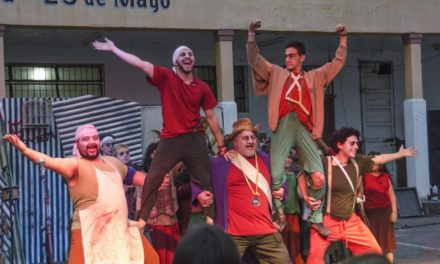Alfredo Arias has been based in France for many decades now, but he is an increasingly frequent visitor to the Argentine stage—recent works seen in Buenos Aires include Tatuaje (English title: Tattoo, 2009), Cinelandia (Cinemaland, 2016), and Divino Amore (Divine Love, 2018). Argentine myths regularly feature in his work—icon Evita, actress Fanny Navarro, singer Miguel de Molina, to name but three. For his latest production, he turns María Estela Martínez Cartas de Perón, better known as Isabel or Isabelita Perón, who served as Vice-President during her husband’s third term as President (1973-74) and then went on to replace her husband as President following his death in office in 1974. With the Minister of Social Welfare, José López Vega, forming the Argentine Anticommunist Alliance (Triple-A) that carried out forced disappearances, and the increased social unrest and concessions to the military that marked her unstable time in office, Isabelita was deposed by the military junta in 1976. Under house arrest in the gothic Messidor castle in Patagonia’s picturesque Villa la Angostura, one of several isolated locations she inhabited before being sent into exile in Spain in mid-1981, Happyland envisages Isabelita out of the political limelight. Here, the past comes back to haunt her. Only this past is less about her time as President and more the years spent at a cabaret in Panama, at the aptly named “Happyland” bar where she worked as a performer when she met Perón in the mid-1950s.
Cabaret music hall serves as the defining performance register for Gonzalo Demaría’s manic farce. Josefina Scaglione plays the young Isabel in 1955 Panama who is caught in a tussle with her elder self in exile, played by Alejandra Radano. The elder Isabel is effectively under house arrest in 1976, with her Andalusian maid Charito (María Merlino) attending to her needs and her butler-cum-housekeeper Lucrecia who, in Marcos Montes’s crisp performance, buzzes around the stage in a neat black suit, serving as her jailer. Adriana Pegueroles plays the goose-stepping lean Archbishop who visits Isabel intermittently and serves as her de facto confessor.
Bright colors, boxy suits, and larger than life gestures give the piece something of the look of a John Waters film fused with the verbal anarchy of Joe Orton. Axel Krygier’s musical numbers may have a feelgood tune to them but listen carefully and the lyrics articulate that which the characters dare not speak about—death squads, unrest, ghosts that haunt the living. The happy exterior hides a less than sanitized interior.
Evita is never far from the surface, a specter that haunts Lucrecia who becomes increasingly possessed by her spirit. Isabelita too cannot escape her more charismatic and popular predecessor or the specter of her husband. When she tries to escape into the lake, Isabelita is punished for her transgression, hair shaved off, she is dressed as Perón in full military attire. Happyland presents Isabelita as constantly trapped in a state of in-betweenness: between the much loved Evita and the husband who was forced to marry her to remain in exile in Spain; between her carefree younger self dancing languidly with the club owner (and possible spy), the dapper moustached Cuban Joe Herald (Carlos Casella), and a stiff, formally-attired middle-aged woman deposed from power and imprisoned by a military regime creating a house of horrors with their culture of forced disappearances. When Isabel (as Perón) and Lucrecia (as Evita) converse at the play’s end, it is the phantoms of contemporary Argentina that appear to be in dialogue, foundational figures of the country’s psyche that hover over both the action and the characters. Montes’s Evita is, however, like an automated doll; she waves mechanically with a limited repertoire of well-worn gestures. These icons have become cliched automatons frozen in time.
The performances by the cast of six have panache and pace. The costumes look good enough to eat—an array of symmetrical cuts and sharp colors defining Radano’s Isabelita and Merlino’s Charito. Radano provides an uncanny mimicry of Isabel Perón’s gestures, moves, and tone of voice; her Isabelita is a contradictory figure, the country’s first woman president who wants to know ‘Why they want to erase me?’ but also a rabid anti-feminist with no time for the weak or the vulnerable. There is an air of Margaret Thatcher in the way she carries herself, an iron lady of sorts who hides behind dark glasses and a high beehive hairstyle that makes her appear taller and more imposing than those around her. Josefina Scaglione’s younger Isabelita (or María Estela as she was then) is anything but constrained. There is a freedom in her moves that finds an echo in the tropical haven (conceived in bright, lurid colors) that is 1950s Panama in Julia Freid’s glass-paneled set. The glass panels distort those who stand behind, reflected landscapes that accentuate the grotesque dimensions of the piece. The thrust stage encourages the performers to jut out; the white coffins on stage speak to the casualties left behind at the end of Isabelita’s time as president. This is a country littered with corpses.
Arias’ production is marked by the outlandish, baroque energy that infuses all his stage work. The text isn’t as satirical or as tight as Copi’s Eva Perón and lacks the bite of Jean Genet’s The Maids, as such the piece doesn’t quite seem to have the unsettling pull of the best satires. That said, this is an intelligent piece of theatre that never finds easy refuge in realist paradigms. Arias thinks big—big acting, big ideas, larger than life characters. This technicolor world is bold and brash and it asks its audience to position themselves within a broader social landscape where myth, politics, history and culture fuse to disquieting effect.
Happyland runs at the Teatro San Martín Sala Casacuberta until 15 December 2019.
This post was written by the author in their personal capacity.The opinions expressed in this article are the author’s own and do not reflect the view of The Theatre Times, their staff or collaborators.
This post was written by Maria Delgado.
The views expressed here belong to the author and do not necessarily reflect our views and opinions.


















